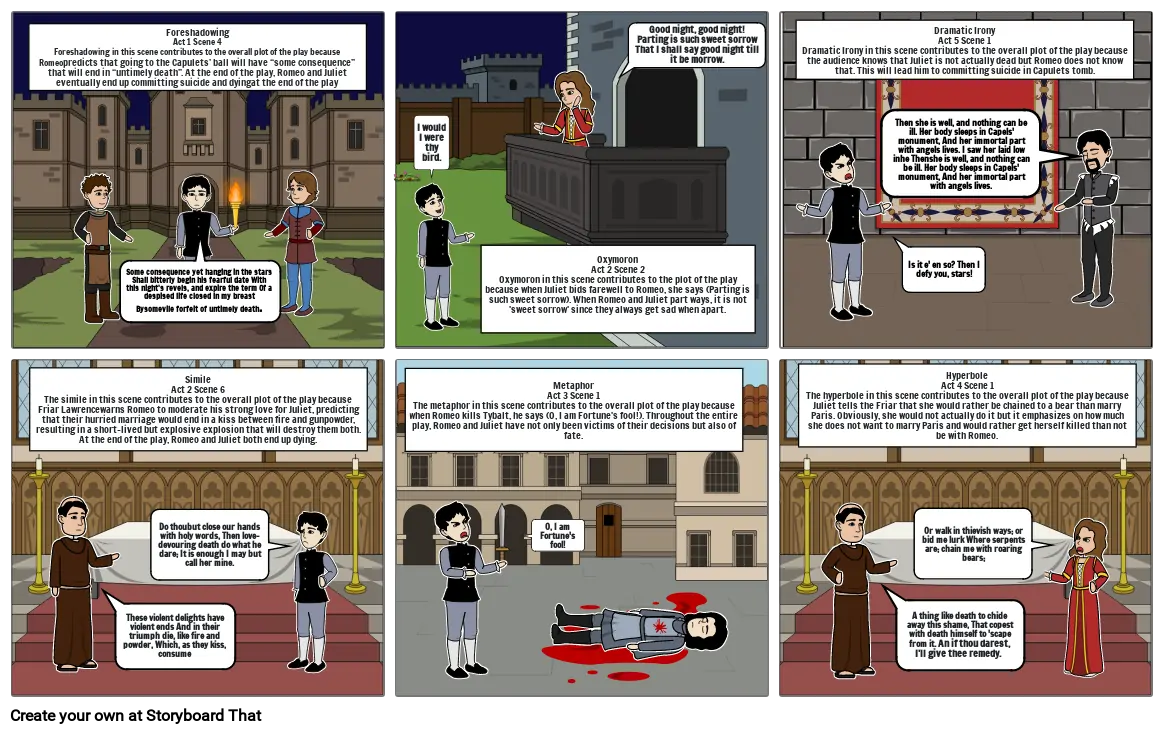Romeo and Juilet

Storyboard Text
- ForeshadowingAct 1 Scene 4Foreshadowing in this scene contributes to the overall plot of the play because Romeopredicts that going to the Capulets’ ball will have “some consequence” that will end in “untimely death”. At the end of the play, Romeo and Juliet eventually end up committing suicide and dyingat the end of the play
- Some consequence yet hanging in the stars Shall bitterly begin his fearful date With this night's revels, and expire the term Of a despised life closed in my breast Bysomevile forfeit of untimely death.
- I would I were thy bird.
- OxymoronAct 2 Scene 2Oxymoron in this scene contributes to the plot of the play because when Juliet bids farewell to Romeo, she says (Parting is such sweet sorrow). When Romeo and Juliet part ways, it is not 'sweet sorrow' since they always get sad when apart.
- Good night, good night! Parting is such sweet sorrow That I shall say good night till it be morrow.
- Dramatic IronyAct 5 Scene 1Dramatic Irony in this scene contributes to the overall plot of the play because the audience knows that Juliet is not actually dead but Romeo does not know that. This will lead him to committing suicide in Capulets tomb.
- Is it e' en so? Then I defy you, stars!
- Then she is well, and nothing can be ill. Her body sleeps in Capels' monument, And her immortal part with angels lives. I saw her laid low inhe Thenshe is well, and nothing can be ill. Her body sleeps in Capels' monument, And her immortal part with angels lives.
- SimileAct 2 Scene 6The simile in this scene contributes to the overall plot of the play because Friar Lawrencewarns Romeo to moderate his strong love for Juliet, predicting that their hurried marriage would end in a kiss between fire and gunpowder, resulting in a short-lived but explosive explosion that will destroy them both. At the end of the play, Romeo and Juliet both end up dying.
- These violent delights have violent ends And in their triumph die, like fire and powder, Which, as they kiss, consume
- Do thoubut close our hands with holy words, Then love-devouring death do what he dare; It is enough I may but call her mine.
- MetaphorAct 3 Scene 1The metaphor in this scene contributes to the overall plot of the play because when Romeo kills Tybalt, he says (O, I am Fortune's fool!). Throughout the entire play, Romeo and Juliet have not only been victims of their decisions but also of fate.
- O, I am Fortune's fool!
- HyperboleAct 4 Scene 1The hyperbole in this scene contributes to the overall plot of the play because Juliet tells the Friar that she would rather be chained to a bear than marry Paris. Obviously, she would not actually do it but it emphasizes on how much she does not want to marry Paris and would rather get herself killed than not be with Romeo.
- A thing like death to chide away this shame, That copest with death himself to 'scape from it. An if thou darest, I'll give thee remedy.y
- Or walk in thievish ways; or bid me lurk Where serpents are; chain me with roaring bears;
Over 30 Million Storyboards Created

